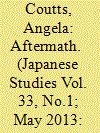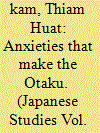|
|
|
Sort Order |
|
|
|
Items / Page
|
|
|
|
|
|
|
| Srl | Item |
| 1 |
ID:
120579


|
|
|
|
|
| Publication |
2013.
|
| Summary/Abstract |
This article highlights the important contribution made by Kamichika Ichiko to the interwar publishing scene by providing an overview of the literary journal Fujin Bungei launched by her and an analysis of three stories it published from leading female writers of the era, Matsuda Tokiko, Hirabayashi Eiko and Asai Hanako. Fujin Bungei was a rare oppositional voice within the media that questioned the narrow nationalism sanctioned and promoted by the Japanese state when others had fallen silent or been silenced. Furthermore, its focus on writing by women provided a forum for passionate and provocative works which shed new light on the downfall of the Proletarian Literature Movement.
|
|
|
|
|
|
|
|
|
|
|
|
|
|
|
|
| 2 |
ID:
120581


|
|
|
|
|
| Publication |
2013.
|
| Summary/Abstract |
The term 'otaku' is generally used in Japan to denote subcultures revolving around the consumption of popular culture, such as manga, anime and games. This paper, however, seeks to analyze 'otaku' as a label applied to individuals whose consumption is perceived and judged to have compromised certain values in contemporary Japan. Through analysis of interviews with a group of Japanese students, I found that the values they invoke to judge who the 'otaku' are, and which they construe as a form of common sense concerning consumption, correspond to the demands of advanced capitalism: consumption should be productive of capital, either leading to further production or fostering communication that is directly productive. At the same time, people are labeled as 'otaku' not merely for failing to produce capital through their consumption, but also for actively practicing a perversion of the capacities that are necessary to advanced capitalist Japan, most notably imagination and autonomy. 'Otaku' labeling thus points to capital's anxieties over capacities such as imagination, knowledge and autonomy: these capacities, while essential to a flexible and immaterial economy, could potentially become unproductive and threaten advanced capitalism.
|
|
|
|
|
|
|
|
|
|
|
|
|
|
|
|
| 3 |
ID:
120580


|
|
|
|
|
| Publication |
2013.
|
| Summary/Abstract |
This article analyzes examples of literature from the 1980s in light of recent critical emphasis in postmodern studies on hypermedia, a medium of information in which texts, data records, and media files are linked together in a non-linear format. Critics such as Azuma Hiroki associate the decentering impulse of hypermedia with consumer habits in the 2000s; these ideas played a central role in the development of postmodern writing in the 1980s and its resistance to the attempts of colloquial movements like genbun itchi to reaffirm the value of the narrative form and the centrality of the author function. The narrative fragmentation encouraged by the work of Tanaka Yasuo, Takahashi Gen'ichiro, and Kobayashi Kyoji enables a form of critical engagement better suited to the decentralized postmodern condition than the previous author-centered literary tradition. Their metafictional writing self-consciously addresses the conventions of fiction in order to demonstrate how technology, information, and the changing view of the author influence the database imagination of Japan's postmodern condition.
|
|
|
|
|
|
|
|
|
|
|
|
|
|
|
|
| 4 |
ID:
120582


|
|
|
|
|
| Publication |
2013.
|
| Summary/Abstract |
During Japan's High Economic Growth Period (1955?1973), school-affiliated sports clubs served as important socialization mechanisms creating strong, healthy, and disciplined workers who would later serve Japanese companies. Since the 1980s, however, there have been new approaches in the management of companies and sports teams in Japan, especially in terms of a new performance-based hierarchy that places the onus on individuals to think independently and be creative on the court or in the cubicle. While sports clubs continue to habituate members into a particular vocabulary that encourages effort, discipline, and teamwork - language that will continue to be used after they join corporate Japan - changing economic landscapes have ushered in the introduction of new coaching pedagogies to Japanese sports, and therefore new expectations for Japanese athletes. These athletic expectations happen to mirror new expectations of young Japanese workers. Drawing on long-term fieldwork with a university basketball club, this article demonstrates that while sports continue to be perceived as educational tools that build 'team-players' to serve companies, they are today being asked to cultivate independent, innovative, and flexible company employees as well; and reconciling these two rather conflicting goals has proved to be easier said than done.
|
|
|
|
|
|
|
|
|
|
|
|
|
|
|
|
| 5 |
ID:
120584


|
|
|
|
|
| Publication |
2013.
|
| Summary/Abstract |
The process of internationalisation is exerting pressure on governments around the world to recognise the rights of their indigenous peoples. This article investigates the current legal framework for minority language protection in Japan, where a history of assimilation has threatened the ancestral language and culture of the Ainu minority. The situation in Japan is contextualised within a broader discussion of minority language protection at global and European level in order to better understand the political environment in which a shift in policy for the protection of minority languages has begun. Although the implementation of a new law to promote Ainu culture has led to limited benefits for the Ainu, the fact that Japan continues to deny that the Ainu were colonised and dispossessed of resources acts as a barrier to reconciliation and a way forward. Findings indicate that the processes of internationalisation are conducive to increased international cooperation to promote consensus, greater social inclusion and more opportunity for minorities to participate in political structures. A further significant finding is that an acceptance of diversity and local autonomy can lead to an assurance of human rights.
|
|
|
|
|
|
|
|
|
|
|
|
|
|
|
|
| 6 |
ID:
120583


|
|
|
|
|
| Publication |
2013.
|
| Summary/Abstract |
Many recent studies have discussed the features of Japanese civil society. Some of them point out that these have been greatly affected by the legacy of the new left movements, a network of anti-Vietnam War groups, student groups, and young workers' groups which developed toward the end of the 1960s. This article explores the formation and development of the ideas and actions of the Japanese new left movements, examining the discourse of student activists in particular. These activists were critical of the conservative consciousness - which they termed 'everydayness' - which was a product of the economic boom of that decade, and sought to transform it. They were willing to take confrontational direct action against armed police officers on streets and on campus in spite of the risks of arrest and injury. I analyse their activism, and the reasons leading to it. By exploring the ideas and actions of new left movements, this paper aims to historicize certain features of Japanese civil society.
|
|
|
|
|
|
|
|
|
|
|
|
|
|
|
|
|
|
|
|
|